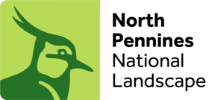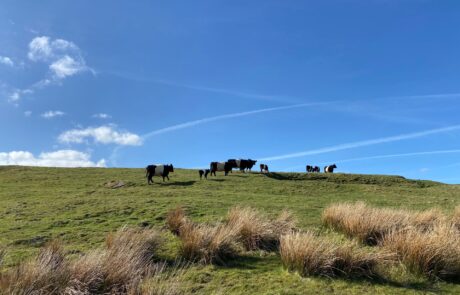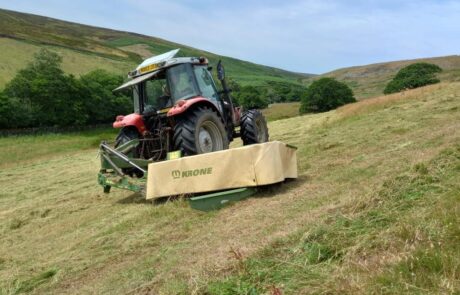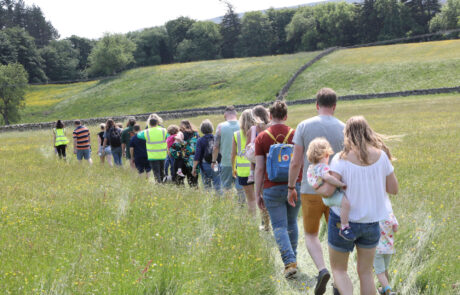News
High Nature Value Farming Awards
Nominations open for High Nature Value Farming Awards
24 July 2024
The North Pennines National Landscape and the Yorkshire Dales National Park Authority have opened nominations for a prestigious award for nature-friendly farmers and land managers in Upper Teesdale and Upper Swaledale.
Through Tees-Swale: Naturally Connected programme, funded by The National Lottery Heritage Fund, the two organisations are seeking nominations of the best examples of High Nature Value farming.
The High Nature Value Farming Awards aim to recognise and reward examples of the nature-friendly upland farming practices which have sustained the largest expanse of semi-natural habitats in England.
Helen Featherstone, Director, England, North at The National Lottery Heritage Fund, said: “The forward-thinking and collaborative work being done as part of the Tees-Swale: Naturally Connected project, to boost biodiversity, mitigate climate change and connect people to nature, aligns firmly with our key priorities at the Heritage Fund. So, we are incredibly proud to support this awards programme that will see local farmers and land managers recognised for their contributions and the vital work they’re doing to support a more resilient and nature-rich landscape.”
The principles from Making Space for Nature (the ‘Lawton Report’), of ensuring that more and bigger areas of land are managed with nature in mind, that land is managed more effectively for conservation, and that habitats are more effectively connected across the landscape, are at the core of the Tees-Swale: Naturally Connected project.
British ecologist, Professor Sir John Lawton, is chair of the Tees-Swale project board and also chair of the award’s judging panel. Previously head of Natural Environment Research Council (NERC) and the last chair of the Royal Commission on Environmental Pollution, he led the independent review of England’s wildlife areas, published as ‘Making Space for Nature’ in 2010. Sir John said: “This natural heritage, and the high-nature value farming systems that have sustained it, are under threat in the face of economic pressures and an uncertain future. Their remoteness does not make them immune to the climate and biodiversity crisis, which faces the whole world. If, as a nation, we are to hold on to nature and support its recovery, this is where we must start – and on a transformational scale.”
The awards have three categories with a £500 prize for each:
High Nature Value farming best practice – to recognise farmers and land managers who have continually managed important habitats and species (such as curlew) on their farm and who have integrated sensitive high nature value farming methods into their farming business for many years.
Nature recovery – to recognise farmers and land managers who have carried out work on their holding to create, restore, and expand species-rich habitats.
Public engagement – to recognise farmers and land managers who have created opportunities for the wider public to connect with farming and nature.
The 2023 winners were Ray and Sue Ridley of Kexwith Farm, near Marske in the high nature value farming category, Charlie and Gina Parker of Hill Gill Farm, Baldersdale in the nature recovery category, and Jemma and John Clark of Bowlees Farm, Newbiggin-in-Teesdale in the public engagement category.
Farmers or land managers who farm in the Tees-Swale area can be nominated, either by themselves or others, via our website here.
The Tees-Swale area covers Upper Teesdale and Upper Swaledale, see the map here.
The closing date for nominations is Friday 30 August 2024, 5pm. Shortlisting and judging will take place over the summer/early autumn and winners will be announced on 16 October 2024.
The North Pennines National Landscape and the Yorkshire Dales National Park Authority are working in collaboration with farmers and land managers to deliver the £8.5 million Tees-Swale: Naturally Connected programme, predominantly funded by The National Lottery Heritage Fund. Working across 845 km2 of the northern Pennines, Tees-Swale aims to put farming at the heart of nature and nature at the heart of land management.
Media enquiries
For further information and alternative images, contact the communications team at the North Pennines National Landscape, email: communications@northpenninesaonb.org.uk or call 01388 528801. Images are of Bowlees Farm ©Martin Rogers, Hill Gill Farm Baldersdale and Kexwith Farm, near Marske ©North Pennines National Landscape.
About The National Lottery Heritage Fund
As the largest dedicated funder of the UK’s heritage, The National Lottery Heritage Fund’s vision is for heritage to be valued, cared for and sustained for everyone, now and in the future as set out in our strategic plan, Heritage 2033.
Over the next ten years, the Heritage Fund aims to invest £3.6billion raised for good causes by National Lottery players to bring about benefits for people, places and the natural environment.
The Heritage Fund helps protect, transform and share the things from the past that people care about, from popular museums and historic places, our natural environment and fragile species, to the languages and cultural traditions that celebrate who we are.
The Heritage Fund is passionate about heritage and committed to driving innovation and collaboration to make a positive difference to people’s lives today, while leaving a lasting legacy for future generations to enjoy.
Follow @HeritageFundUK on Twitter, Facebook and Instagram and use #NationalLotteryHeritageFund www.heritagefund.org.uk.
The North Pennines National Landscape is one of England’s most special places – a peaceful, unspoilt landscape with a rich history and vibrant natural beauty. It was designated as an Area of Outstanding Natural Beauty (AONB) in 1988. The purpose of this nationally recognised designation is the conservation and enhancement of the natural beauty of the area.
The North Pennines National Landscape Partnership is an alliance of public, statutory and voluntary sector bodies with an interest in the future of the North Pennines. The work of the Partnership is carried out by the National Landscape team which takes action to conserve and enhance the natural beauty of the area, to raise awareness of its special qualities and to improve the quality of life for local people.
Tees-Swale: Naturally Connected The North Pennines National Landscape and the Yorkshire Dales National Park Authority are working with partner organisations to deliver a major natural heritage programme that focuses on the landscape and communities of Upper Teesdale and Swaledale. Tees-Swale: naturally connected covers 829 square kilometres of Teesdale in the North Pennines Area of Outstanding Natural Beauty and Swaledale in the Yorkshire Dales National Park. Inspired by the report ‘Making Space for Nature’, the programme aims to restore, expand and connect habitats across the uplands of Teesdale and Swaledale, showcasing how public funds can enhance wildlife and deliver multiple public benefits. The ethos of the programme is to work closely and in partnership with farmers, landowners, and conservation agencies from the outset. In so doing, we will build the relationships and establish the skills required to sustain our High Nature Value farming systems.
High Nature Value farming is a term used to describe low intensity farming systems that are particularly valuable for wildlife, the environment, and people. The concept of knowledge exchange will be a core principle of the programme, with farmers encouraged to share their land management skills and experience, in order to target habitat improvement and restoration, in a way that allows the whole farm to work as a system.
The Yorkshire Dales National Park is one of 15 National Parks in the UK. It is administered by the Yorkshire Dales National Park Authority, which has two main purposes: “to conserve and enhance the natural beauty, wildlife and cultural heritage” and “to promote opportunities for the understanding and enjoyment of the special qualities of the National Park”. In carrying out these purposes, the Authority has a duty “to seek to foster the economic and social wellbeing of local communities”. The National Park Authority comprises 25 members, made up of county and district councillors and members appointed by the Secretary of State for the Environment to represent parishes or in recognition of their specialist skills or knowledge.










